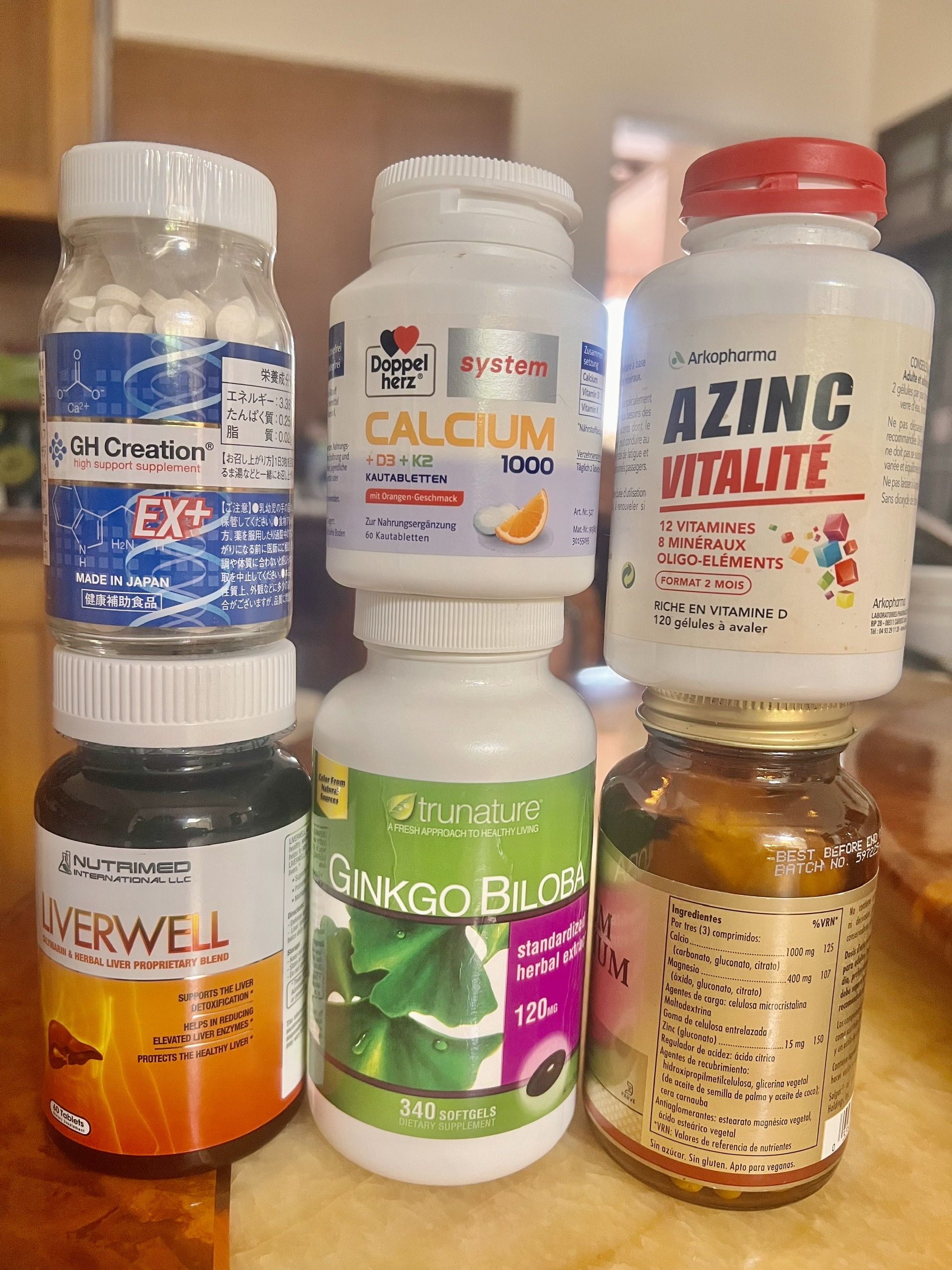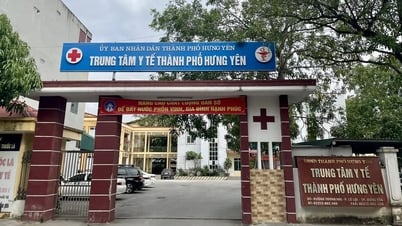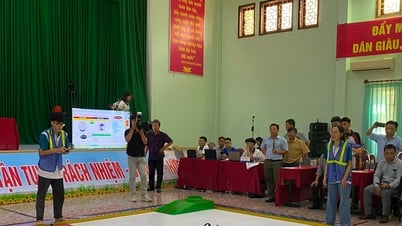Many types of functional foods were ordered online by Ms. Hoai based on a few lines of advertising without knowing the origin clearly - Photo: HN
Having suffered from arthritis for many years, Ms. Thanh Hoai (45 years old), from Vinh Linh district, regularly takes medication. Most of the time, Ms. Hoai takes the medication according to a doctor's prescription, purchased at the hospital pharmacy. However, for functional foods for bone and joint health, she has long purchased them online. Now, reading the news that the authorities have just dismantled a counterfeit drug ring, many of which are related to bone and joint diseases, she cannot help but worry.
Because she bought so many types, Ms. Hoai had to look up her transaction history from a long time ago to check. “Although there is no medicine on the list of counterfeit medicines recently discovered by the authorities, I still feel uneasy. With medicines, I absolutely follow the doctor's prescription, but with functional foods that support bone and joint diseases, I am somewhat subjective. In addition to buying online, I also buy through the introduction of acquaintances, and I prefer hand-carried goods,” Ms. Hoai shared.
This is also a habit of many people. Some people think that foreign-made drugs are often better than domestic drugs. Therefore, functional foods of foreign origin are widely consumed in the country. Mr. Le Van Loc, Vinh Thuy commune, Vinh Linh district, is one of those who likes to use functional foods, especially those advertised as good for the heart. After being diagnosed with heart disease, he regularly used Japanese spirulina, 30 pills a day. However, his source of purchase was unstable, sometimes he bought it at a pharmacy, sometimes he ordered it online. His children provided him with money every month, so he did not worry. Although his son later went to work in Japan, Mr. Loc still maintained this habit to avoid bothering him.
The habit of buying medicine and functional foods online and buying hand-carried goods is fraught with many risks. Taking advantage of consumers' lack of knowledge, subjective psychology and loopholes in market control, counterfeit drugs are appearing more and more with increasing sophistication. Not only are counterfeit drugs produced domestically, but a large amount is produced abroad, then imported into Vietnam under the label of "hand-carried goods". Meanwhile, people still maintain the habit of buying medicine without a doctor's prescription, without checking the packaging, and not even caring about the origin of the medicine they are using. Knowing the "foreign-loving" mentality of many people, many people use social networks to advertise and introduce medicines and functional foods as "hand-carried goods". To increase customer trust, these people counterfeit anti-counterfeit stamps, fake QR codes, and imitate the design of real medicines to the point that it is difficult to distinguish without expertise. From antibiotics, high blood pressure and diabetes medications to dietary supplements, all can be targets for counterfeiters.
According to Dr. Tran Canh Toan, acting director of Vinh Linh Regional General Hospital, many types of pharmaceuticals that require strict prescriptions from doctors are being counterfeited very sophisticatedly in Vietnam. This is not only an act of commercial fraud but also a direct threat to human life. Many types of counterfeit drugs are packaged like the real thing, mixed with real drugs and distributed in small quantities to the market, making them very difficult to detect. "Therefore, absolutely do not buy drugs through social networks, personal pages of unknown identities or through livestreams - channels with a very high risk of spreading counterfeit drugs," said Dr. Toan.
According to Dr. Ngo The Nam, Provincial General Hospital, in terms of medicine, counterfeit drugs bring many serious consequences, of which treatment failure is one of the most common consequences. “For dangerous diseases such as infections, cardiovascular disease or cancer, the use of counterfeit drugs can cause patients to miss the optimal treatment time, leading to loss of the chance to live. In addition, counterfeit drugs also pose a risk of poisoning and allergies due to containing toxic impurities, seriously affecting the liver, kidneys, cardiovascular system or causing life-threatening anaphylactic reactions,” said Dr. Nam.
Faced with this situation, preventing counterfeit drugs is not only the responsibility of the management agency but also requires initiative and vigilance from the people. People need to be careful when using drugs, should only buy at licensed facilities, strictly follow the doctor's instructions and absolutely do not buy drugs online or through channels of unknown origin. Some signs of counterfeit drugs are often accompanied by unusually "soft" prices, large differences compared to the market, and advertising tricks such as "miracle drug", "cure all diseases", "cheap hand-carried drugs"... To ensure their own safety, people need to go to the lookup system to check whether the drug is real or fake before buying. Accordingly, people can access the link https://dichvucong.dav.gov.vn/congbothuoc to check the type of drug they buy. If there is no information about the product, it is a counterfeit drug. In case there is drug name information, but other information about the manufacturer... is not the same as the product on the system, then it is not a genuine drug. When buying, you need to pay attention to the drug packaging must be intact, not torn, not blurred and have no signs of modification.
Good news for consumers is that the Law amending and supplementing a number of articles of the Law on Pharmacy (Law No. 44/2024) officially takes effect from July 1, 2025. Accordingly, only non-prescription drugs are allowed to be traded (retailed) via e-commerce. The Ministry of Health is also proposing to amend Decree 117/2020/ND-CP of the Government, which adds provisions on strict penalties for trading in counterfeit drugs, drugs of unknown origin, etc.
Hoai Nam
Source: https://baoquangtri.vn/canh-giac-voi-thuoc-gia-193554.htm






![[Photo] Party and State leaders visit former President Tran Duc Luong](https://vphoto.vietnam.vn/thumb/1200x675/vietnam/resource/IMAGE/2025/5/24/960db9b19102400e8df68d5a6caadcf6)
























![[Photo] Anh Hoang - Dinh Duc successfully defended the men's doubles championship of the National Table Tennis Championship of Nhan Dan Newspaper](https://vphoto.vietnam.vn/thumb/1200x675/vietnam/resource/IMAGE/2025/5/23/d6ab3bcac02c49928b38c729d795cac6)








































































Comment (0)